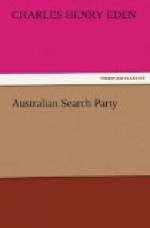I am afraid that it is often the habit with us Australians to either destroy or carry away as curiosities, the weapons and other little things that the blacks manufacture, utterly regardless of the loss we thus inflict upon them; for without his weapons the wretched native is not only defenceless against neighbouring tribes, who would not scruple to attack him when unarmed, but he is also literally deprived of the means of subsistence. Without his spear, he is unable to transfix the kangaroos and wallabies on which he so much depends for his daily food, and, robbed of his boomerangs and nullah-nullahs, the wild duck can pass him scatheless, and the cockatoo can scream defiance from the lofty trees. I know that this practice of returning laden with native spoil is more frequently the result of thoughtlessness or curiosity than anything else. The implements appear so trumpery, that the European thinks they can be of little use to anybody, but the bad blood thus engendered between the aborigines and the settlers is greater than would be easily credited. Another reason, I would venture to submit, in opposition to this custom is, that in the case of the blacks doing any mischief, no method of punishing them can possibly be devised equal in severity to the destruction of their weapons. A tribe is rendered more helpless and more innocuous by this than by shooting down half the males, and I am sure that if they once found that only in case of mischief was this punishment resorted to, we should hear infinitely less of cattle-spearing and shepherd-murdering than at present obtains. I mention this, not from any good-will towards the blacks, who have been causes of much sorrow to me and mine, but because I am sure that a discontinuance of this idle habit would tend to lessen the existing causes of friction between the two races.
In one of the camps we found a blanket — not, O reader, made of the finest wool, deftly woven at the looms of Witney, but a blanket of Dame Nature’s own contrivance, stripped by the aboriginal from the bark of the Australian tea-tree (’Melaleuca squarrosa’), no small shrub, but a noble fellow standing from 150 to 200 feet high, and generally found in the neighbourhood of fresh water, or in the beds of creeks. The bark of this tree is of great thickness, and composed of a series of layers, each of which can be easily separated from its neighbours, and, in fact, much resembling a new book, just issued from the hot-press of the binder. From a portion of this — the inner skins, I imagine — the blacks manage to make a flexible, though not over warm, covering for the winter nights, or for the newly-born piccaninnies. The whole of the process I am not acquainted with, but from all I could gather from Lizzie, the bark is stripped in a large sheet at the end of the rainy season, the inner cuticle of several leaves carefully separated from the remainder, and placed in fresh water, weighted with heavy stones to retain




